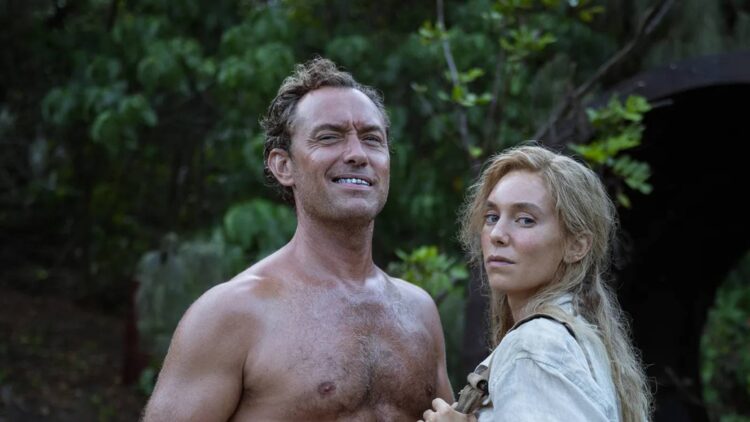On paper, there are few filmmakers who seem less-suited to the rigors of a project like Eden than Ron Howard. This is the grim story, after all, of real-life individuals in the late 1920s who were so troubled by the state of humankind that an escape to the Galápagos Islands seemed like the only sensible way out. This is a tale replete with deception, murder, tooth-extraction, one of the more ridiculous childbirth scenes in cinema, and, in what may be a first for Howard, male frontal nudity. (Though my memory of Cocoon is fuzzy.)
Still, Howard deserves credit for taking on a variety of complex projects along with his more audience-friendly efforts. For every The Da Vinci Code or Solo: A Star Wars Story, there is a Frost/Nixon or Rush. (Let’s leave Hillbilly Elegy out of this.) Eden attempts to combine both styles––grit with triumph of the human spirit. And for its first half, the film is mostly successful. In its second, though, Eden becomes predictable, tiresome, and monotonous, qualifying it as a disappointment.
Jude Law––giving the film’s strongest performance––plays Dr. Friedrich Ritter, who achieved worldwide notoriety for leaving Germany with his partner, Dora Straugh (Vanessa Kirby), to start a new life on the uninhabited island known as Floreana. Ritter’s plan was to write a new path forward for a society he believed was doomed. His letters describing life on the island became a sensation. Soon, Ritter’s concept––that Floreana offered a path to survival––was embraced by a Germany’s Wittmers family: WWI veteran Heinz (Daniel Brühl) and his young wife Margaret (Sydney Sweeney) sought a safer place for their son, Harry, to recover from tuberculosis.
Ritter and Straugh are not thrilled by the Wittmers’ arrival, but Ritter grows to respect the young family’s efforts. The arrival of Eloise Bosquet de Wagner Wehrhorn (Ana de Armas)––the “Baroness,” as she calls herself––and three male companions upends life on the island. De Armas makes a movie-star entrance, the Baroness calling herself “the embodiment of perfection” before being hoisted onto the shoulders of her two lovers. The seductive, seemingly wealthy woman has plans to build on Floreana an exclusive hotel for the world’s richest folks.
The world-building from Howard and screenwriter Noah Pink during this opening stretch is impressive, as are the performances from Law, Sweeney, Kirby, and de Armas; Brühl makes much less of an impression until the final stretch. Commendable, too, is the building tension between all parties, especially as the Baroness begins running out of supplies and Margaret prepares to give birth. (Between Eden and Immaculate, Sweeney has cornered the market on disturbed birthing sequences.) It’s after the childbirth scene that Eden begins to lose its way.
As shot by Mathias Herndl, Eden offers breathtakingly lovely shots of Floreana’s landscapes and wildlife, making this film and 2022’s Thirteen Lives two of the finest-looking efforts of Howard’s career. Along with the performances of Law––toothless, seething with frustration and rage––and de Armas, Eden offers many reasons to watch. A shame, then, that the film runs out of steam so dramatically. Seeing how these characters ended up should be mesmerizing, not boring.
Eden wants to leave the audience brimming with respect for the survival skills of Floreana’s inhabitants. Unfortunately, the endless scenes of discord are what will be remembered. This is a script problem that’s never solved. Howard’s ambition is to be applauded, but that alone is not enough to make for successful cinema. Good intentions only go so far––a lesson Friedrich Ritter learned firsthand.
Eden premiered at the 2024 Toronto International Film Festival.
The post TIFF Review: Ron Howard’s Eden Is an Ambitious Disappointment first appeared on The Film Stage.




























